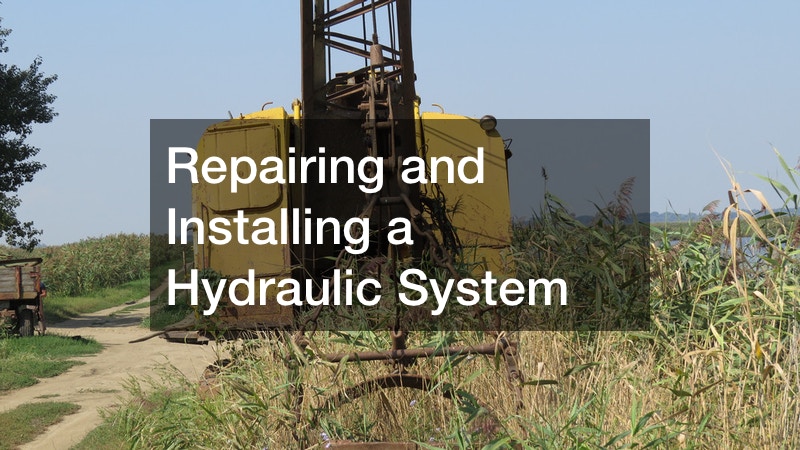
One of the challenges to the complexity of excavator hydraulic system devices remains how to handle an equipment breakdown. Only the most mechanically inclined could attempt do-it-yourself repairs on a hydraulic piston and cylinder. You’ll need to take your equipment to a trained, certified mechanic for repairs.
You might worry that hydraulic piston repair would be rare, but even in small towns like Atoka, OK, you can find a few choices for professional repairs. Since local parts can remain scarce, these stores usually establish vendor agreements with a hydraulic supply store, so they can easily and quickly obtain the parts of hydraulic system devices needed to repair your machine.
When choosing your repair professional, consider the following four important factors:
• Their experience and training
• Competitive pricing and repair estimates
• Turnaround time
• Quality of repairs and reviews.
Obtaining estimates allows you to compare apples to apples while reading their reviews shows you the differences in each company. Pay close attention to any negative reviews and look to see if the same problems repeatedly developed. Once you find a suitable repair person, you can use them for all of your hydraulic equipment and will have a handy vendor to turn to when you need to replace equipment, too.
A hydraulic system is one that uses pressure from fluids to move a mechanical part, often a tube to perform labor. A typical hydraulic system includes such hydraulic parts such as the motor to provide power, a series of valves and filters and pipes, and an actuator, the tube where the work is done. The best hydraulic parts may be found online or with a local supplier, and hydraulic companies may offer spare and replacement parts as well as professionals who can effect hydraulic system repair. A custom hydraulic system will be designed to specifications depending on the job, and a brand-new machine, such as a vehicle or an oil pump, may need a custom hydraulic system to do its job just right if existing systems provide too much or too little power. Which industries make the most use out of hydraulic technology such as custom hydraulic systems?
Where Hydraulics May be Found

A number of industries make use of regular off-the-shelf hydraulic assemblies or custom hydraulic systems in their daily work. Oil pumping, for example, is a large industry in the United States and beyond, and operating oil pumps calls for a hydraulic system to keep everything moving smoothly. A lot of power may be needed for drawing up oil from the ground, so a custom hydraulic system may be designed for custom oil pumps once an oil field is discovered. These hydraulics may be tested ahead of time to ensure that they work smoothly, and that they provide enough power without damaging or warping the rest of the machine. Too much power can cause stress on other metals and components.
Heavy-duty vehicles make all sorts of uses of hydraulics, and many construction vehicles may have hydraulics on them. A dump truck, for example, needs a lot of power to tilt its carrying bed back at such an angle, and powerful hydraulic pistons will be set up to get the job done. Once the dump truck’s driver inputs a command to tilt the carrying bed, the vehicle’s hydraulic system will activate and simply push the dumping bed in such a way that it tilts on its hinges, as intended. These hydraulic pistons can allow the bed to slowly and smoothly return to its original position, offering steadily decreasing resistance to the bed and thus lowering it. Otherwise, the bed may slam back into position, and that could damage the vehicle. Meanwhile, other construction equipment such as backhoes and excavators may make use of pistons to operate their digging and plowing equipment, and this requires plenty of power.
Elsewhere, hydraulics may be found in a smaller scale, such as on commercial vehicles like car doors and back hatches. A minivan’s back hatch, for example, is far too heavy for a human user to manually lift and safely put back into position. Instead, two or more hydraulic systems will be in place to smoothly lift the minivan’s back hatch to its open position and hold it there. Once the human user activates this system, it will lift the hatch as intended. And like with a dump truck, the hydraulics will offer steadily decreasing resistance once the human user moves the hatch back into position smoothly and without excessive force.
Repair Work
Any machine may break down or leak fluids or warp over time, and hydraulics are no exception. If a hydraulic assembly is compromised, such as if the metal is warped due to pressure or heat or if the fluids inside leak, the entire system may either get stuck in place or offer no pressure and lifting power. This can make components on a vehicle or oil pump non-functional, and the leaking fluid may be a hazard in its own right. If this is to happen, the machine’s owner must contact local and trustworthy repair crews at once, such as those who provided the hydraulics to begin with. The better course of action, meanwhile, is to have regular inspections and maintenance done on hydraulic systems and similar hardware so that stresses or leaks can be diagnosed (and thus fixed) early. This can prevent expensive damage to the hydraulics or the vehicle or machine that they are attached to, and this may even prevent risks of worker injury due to items not moving correctly.

